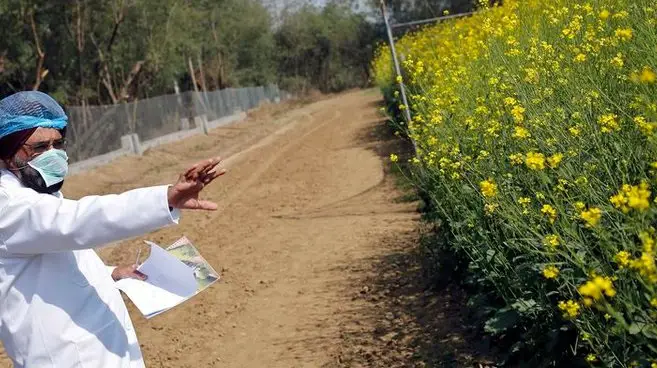
A scientist at an experimental GMO canola field in New Delhi. Photo via Reuters
One of the most misunderstood risks of the genetically engineered food experiment is the fact that these lab-created crops are capable of contaminating neighboring organic and non-GMO crops, an issue that has caused millions of dollars in market losses for farmers in the United States.
While GMOs are widely cultivated in America, other countries overseas, including the roughly 20 countries that ban GMOs in Europe, avoid them like the plague.
And when GMO crops are found to contaminate natural crops nearby, these countries don’t mess around — as evidenced by what happened in France recently regarding a form of unauthorized GMO crop that was found growing on nearly double the amount of farmland expected.
French Farmers Destroy Nearly 50,000 Acres of GMO Crops
According to a report from Reuters earlier this year that was completely ignored in the U.S. media, French farmers destroyed over 18,000 hectares (more than 44,000 acres) of rapeseed (also known as canola or canola oil in its finished form), after the discovery of non-authorized genetically modified organisms in their seeds, the German GMO and pesticide giant Bayer announced.
France currently bans the cultivation of these GMOs due to environmental and other risks, even though over 90 percent of the canola produced in the United States is genetically modified.
Following the French farmers’ decision, German farmers also destroyed over 2,000 hectares of GMO canola as well.
The crops were destroyed prior to the flowering season, which could have led to the spread of the banned GMO variety in their fields. The affected seed was sold under the Deklab name, which was originally developed by Monsanto, the controversial company purchased by Bayer last year.
Bayer said that the cause of the contaminated seeds, produced in Argentina in a GMO-free zone, surprisingly enough, was not known. But it shows the vast scale of contamination that is caused when GMO seeds are released unchecked into the environment.
Trump, United States Double Down on GMOs As Rest of the World Bans Them
Despite Europe’s continued insistence on banning GMOs, toxic pesticides (as was the case recently when Germany banned glyphosate), and other similar events, U.S. President Donald Trump recently caved in to Bayer yet again, signing an executive order allowing GMO crops and animals to flood the market without scientific review.
As a result an increasing number of GMOs, including the first-ever genetically modified salmon, are expected to be fast-tracked to the market without long term safety testing.
To make matters worse, it’s all coming at a time when alternative health and anti-GMO pages are being censored and shut down across social media, and by Google.
Needless to say, the deck is becoming more stacked than ever against proponents of natural and organic food and medicines despite the market’s recent success, and it’s up to us to see to it that this GMO experiment doesn’t become the “new norm” in a country where chronic health problems reign and the “probable human carcinogen” glyphosate continues to permeate our air, food, and drinking water.
The best way to support the movement is of course to continue buying organic from small and local farmers, and to continue to spread the word about the way other countries’ food systems protect their citizens against them, in stark contrast to what’s happening here in Monsanto and Bayer’s backyard.
Thank you for reading! For more articles like these in your inbox (plus a free eBook), click here.
Thanks for installing the Bottom of every post plugin by Corey Salzano. Contact me if you need custom WordPress plugins or website design.




